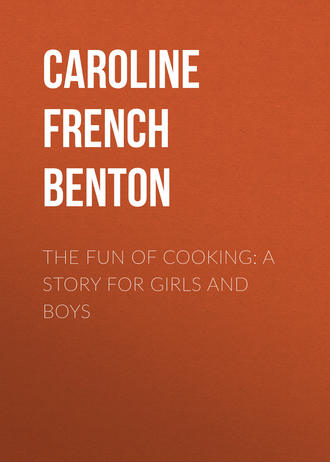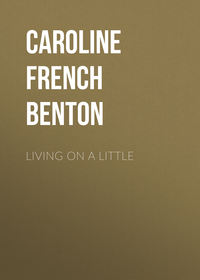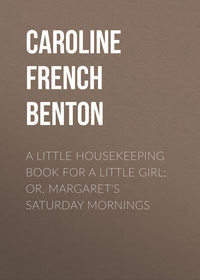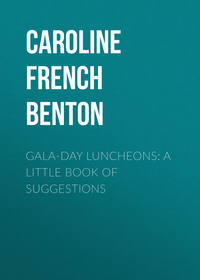 полная версия
полная версияThe Fun of Cooking: A Story for Girls and Boys
One day, they caught a perfectly huge fish, too large to broil well, and then their little stove proved a treasure, for the oven would just hold a baking pan; they cooked it in this way:
BAKED FISHClean and scale the fish, but do not take off the head or tail. Slice an onion fine, and fry brown in two tablespoonfuls of fat; add to this a cup of fine, dry bread crumbs and a little salt and pepper, and stir till brown. Wipe dry the inside of the fish, and put this stuffing in; wind a string around the outside to hold it firmly in place. Put in a pan with four slices of salt pork or bacon, and lay three or four more on the top of the fish; shake a little flour, salt, and pepper over all. Bake in a hot oven till the skin begins to break open a little; every fifteen minutes open the oven door and baste the fish; that is, pour a spoonful of juice from the pan over the fish; if there is not enough, pour a small cup of boiling water into the pan.
With this they had
BOILED ONIONSPeel onions of about the same size, and drop them in a kettle of boiling, salted water; when they have cooked half an hour, throw this water away and put them in fresh boiling water. This will prevent their being too strong. Cook for one hour altogether. Put melted butter, pepper, and salt over them.
Before they could possibly think it was time to go home, their vacation was over.
For dinner, the last night, Father Blair made something very good indeed:
CAMP PUDDING½ pound of dried prunes.
8 slices of bread, cut thin and buttered.
½ cup of sugar.
1 tablespoonful of butter.
Wash the prunes and cover them with cold water, and let them stand all night. In the morning, put them on the fire in this water, and cook slowly till they are very soft; then take out the stones. Line a dish with the bread, cut in pieces, with a layer on the bottom; put on a spoonful of prunes and juice, then a layer of bread, and so on till the dish is full, with bread on top; sprinkle with sugar and bits of butter and bake brown.
"My, but we've had a good time!" said Jack, thoughtfully rubbing the end of his sunburned nose as he watched the shores of the lake fade away the next day. "I never supposed it was such fun to camp. And I've become quite a cook; now haven't I, Father Blair?"
"I should say you had. Too bad your mother and the girls can't know about it. But they will never know!" and his father smiled mischievously.
"Well, perhaps some day I'll cook something for them," said Jack, sheepishly. "I don't mind knowing how to cook as much as I thought I should, now that I know men cook. I guess I'll surprise them some day, Father!"
CHAPTER X
JAMS AND JELLY
Norah was preserving peaches. The fragrant odor filled the house one day, and Mildred sniffed it delightedly. "Dear me! I wish I could make preserves," she sighed. "Norah's always look so lovely in their jars, and they taste so good, too. I wonder if she would let me help her?"
But no, Norah would not. Peaches, she explained, must be done up very carefully, and nobody could do them up unless they knew just how.
"But, Norah, if you can't begin till you know how, how does anybody ever learn? And I want to do them so much! Just see how beautiful yours are," and Mildred looked longingly at the row of jars on the kitchen table full of yellow peaches in a syrup like golden sunshine. "Oh, Norah!" she murmured pathetically.
But Norah was firm. Miss Mildred couldn't do up peaches; she was too young; and, anyway, she couldn't be bothered teaching her. So Mildred sighed and gave it up. But when she told her mother about it, Mother Blair laughed.
"You want to begin at the top," she said, "Norah is quite right in saying that peaches are not easy to put up – that is, not the very best, most beautiful peaches, and nobody wants any other kind. But why not make something else to begin with, jams and jellies and other good things? And by the time you know all about those, you will find that peaches will be perfectly easy for you."
Mildred brightened up. "Now that's what I call a good idea, one of your very best, Mother Blair. Can't I make something right away to-day?"
"Just as soon as Norah is all through with her preserving, if she doesn't mind, you may. And perhaps she has something all ready for you to begin on. Run and ask her if you may have the parts of the peaches she did not want to use."
That puzzled Mildred, and as she hurried to the kitchen she thought about it.
"Norah, Mother says you are not going to use all the parts of the peaches, and perhaps I may have what you don't want. But what are they? Because if they are just the skins and stones, I don't want them either."
Norah was just fastening on the last top on her jars of preserves, and she looked very good-natured.
"Sure, I've got lots left!" she said, and showed Mildred a large covered bowl filled with bits of peach pulp.
"I won't put any bruised peaches in preserves," she explained, "so I just cut up peaches with soft spots and put 'em in here; and when I'm done, I make a shortcake out of 'em. If I've got enough, sometimes I make 'em into – "
"Jam!" interrupted Mildred. "Of course! delicious peach jam that I love. Oh, Norah, do let me make some; don't use any of those peach bits for shortcake – let's have something else for lunch."
"Well," said Norah, "I guess you can have 'em." So Mildred ran for her apron and a receipt, which, when she read it over, proved, strangely enough, to be a rule for making not only peach but all sorts of jams.
JAMPrepare your fruit nicely; strawberries must be washed and hulled, peaches pared and cut up, raspberries looked over for poor ones. When they are ready, measure
1 large cup of fruit to
1 small cup of sugar.
Mash the fruit and put it in a kettle in layers with the sugar, and press and stir it till it is all wet and juicy. Then gently boil it, stirring constantly from the bottom up, so the fruit will not burn. Mash with a wooden potato masher till all is smooth. When it has cooked nearly an hour, try a little on a cold saucer and see if it gets firm. When it does, it is done. Some jams take longer to cook than others, because some fruits are more juicy.
This sounded very easy indeed, and Mildred began to mash and measure at once, and soon the jam was over the fire. But it took a long time to cook. Norah brought a dishpan full of jelly-glasses and put them in the sink, and Mildred washed these and dried them and arranged them on two trays, all ready for the jam; but every moment or two she stirred the jam well. By and by, after more than an hour, the peaches looked transparent, and then Norah said they were done; and, sure enough, when she hurriedly put some on a saucer and stood this on the ice in the refrigerator to get it cold quickly, it grew a little stiff and the edges were like jelly.
Mildred carefully lifted the hot saucepan from the fire and began to dip out the jam with a cup and put it in the glasses; when she finished, there were eight of them, all filled with clear golden-pinky-brownish jam, beautiful to look at, and, oh, so good to taste! Mildred ran for her mother and Brownie to look at it. "I wish Father and Jack were here," she sighed, "and Miss Betty, too. I am so proud, I want everybody to see it."
"It really is lovely," said her mother. "I never saw any that was nicer. Next winter we will eat it on hot buttered toast, and put it in layer cake, and have it ready for school sandwiches."
"But only eight little, little glasses," mourned Mildred. "Why didn't I make eight dozen of them?"
"Well, eight dozen is a good many," laughed her mother. "Perhaps – just perhaps, you know, you might find you got tired even of peach jam before you had eaten all those up. But the beauty of making jams in fruit time is that you can make a few glasses of it any time you want to. Peaches are just in season now, and we have them nearly every day, so you can put up more at any time."
"Of course!" said Mildred, delightedly. "I never thought of that. I'll make the rest of my eight dozen yet, Mother Blair; I'm sure it won't be a bit too much."
"Why not make some other things that are just as good? Grapes are in season too, and plums, and pears – "
"I'll make them all! I'll make every single kind of jam that there is!"
"You can make jelly too, and compotes, and spiced things; I'll be so glad to have you learn, and they are all as easy as can be."
"But, Mother, what can I make?" Brownie looked very sober. "Is Mildred going to make everything all alone? I like to make things, too."
"Of course you do, and you shall certainly help; jams are so easy anybody in the world can make them."
"Even Jack?" laughed Mildred.
"Yes, even Jack, if he wanted to. Why don't you and Brownie together make some nice grape jam to-morrow?"
The girls said they would love to; then their mother had them write down a special receipt, because grape jam is the one kind that is different from every other.
GRAPE JAMWash the grapes; take them off the stems one by one as though you meant to eat them, but press them between your fingers and put the skins in one dish and the pulp in another. When you have finished, heat the pulp and stir it till you can see that the seeds have come out; then put the pulp through the colander. Add this to the skins, measure, and follow your regular rule.
This seemed like a queer receipt; grape skins in jam! It sounded rather horrid. But they made it, anyway, and when they had finished, though it was a clear, reddish black, it was really delicious.
It happened that the grapes grew in their own garden, and so many of them were ripe that, when they had used up quite a large basketful, there were plenty left. Norah had been planning to use them in jelly, but she said she could wait a day longer for that, and the girls might have them if they wanted to, and she would show them how to make something very good indeed and very easy. This was:
SPICED FRUIT3 pints of fruit, all prepared.
1½ small cups of vinegar.
1¾ pints of sugar.
2 teaspoonfuls of powdered cinnamon.
1 teaspoonful of powdered cloves.
Boil till thick; about an hour and a half.
In making spiced grapes, prepare them exactly as for jam, and use pulp and skins.
Their mother did not know they were making this new kind of preserve, and she was delighted when she was shown all the little glasses of it.
"All spiced fruits are especially nice with meat," she said, "and with this rule you can spice almost any kind of fruit; pears, or peaches, or apples, or plums – "
"Or strawberries, or pineapple, or raspberries," said Brownie.
"Oh, no! I ought to have said any kind of autumn fruit – that is a good way to remember which ones to use. And, Mildred, Norah divided this rule for you, to make it easier, but when I put up spiced fruit, I take twice as much of everything."
"What a pity I'm so stupid about arithmetic!" sighed Mildred. "Think of having to take twice one and three quarter pints of sugar, and twice one and a half cups of vinegar! I'll never get them right."
"Mildred, you remind me of a story some one told me the other day, about a girl who had just come home from college; it's a true story too, and the girl lives right in this town. She thought she would like to learn to cook, so she found a rule for cake in the cook-book and read it to herself; it began something like this: Three cups of flour, two cups of sugar, three teaspoonfuls of baking-powder, and so on. Presently her mother went into the kitchen and found on the table three cups, all filled with flour, two more cups filled with sugar, one cup of milk, another cup of raisins, three teaspoons in a row, all filled with baking-powder, and so on. Think of that!"
"I s'pose they didn't teach multiplying in that college," said Brownie, sympathetically.
Mildred and her mother laughed. "Well, I suppose I'll just have to learn to do fractions in my head!" said Mildred.
"There isn't any other way, if you are going to be a good cook," her mother replied. "You can't guess at things, or you will spoil them; you have to measure exactly. Now that you have finished these grapes, I'll give you some more receipts, if you want them."
The girls hastened to bring out their pretty red-covered books. "Just see, Mother Blair," said Mildred, turning over the leaves, "how many pages are filled up – with such good things, too!" And she gave a sigh of such complete satisfaction, that her mother laughed. Then they settled themselves at the table to write the new receipts.
APPLE CONSERVE4 pints of apples, measured after they are peeled and cut up in bits.
4 pints of sugar.
2 lemons, juice and grated peel.
2 large pieces of preserved ginger (the kind that comes in little pots).
Mix all together and cook till thick; about an hour and a half.
CRANBERRY CONSERVE2½ pints of washed and chopped cranberries.
2½ pints of sugar.
2 large oranges.
1 pint (or package) seeded raisins, chopped a little, after washing.
Cut the oranges in halves and take out the pulp with a spoon; then scrape the skins well till they are clean and not very much of the white lining is left; chop the rest. Mix all together and cook till thick.
"These two conserves are so very nice that we do not put them on the table and eat them up any day in the week, but save them for Sunday night supper and other times like that," said Mother Blair; "and sometimes they can go into sandwiches for afternoon tea. Now would you like just a very easy jelly? Here is a nice one."
APPLE JELLYWash twenty red apples that are not very sweet; cut them up in small pieces without peeling them or taking out the cores. Put them in a kettle and just cover them with water; cook slowly till it is all like soft apple-sauce. Then put it in a bag – a flour sack is the best – tie up the top, and hang the bag up over night with a large bowl underneath to catch the juice. In the morning measure this. Mix
1 pint of juice.
1 small pint of sugar.
Put on the fire and boil gently twenty minutes, skimming it occasionally; lift off the saucepan and drop into the jelly one large lemon, cut up in quarters, squeezing them a little; then put a small wire strainer over each jelly-glass in turn and pour the jelly into each from a cup.
"There! When you can make that kind of jelly, you will almost have learned how to make any other kind. And this is lovely, so pink and delicate, and it always gets just firm enough and not too stiff to be nice. Now, Mildred, you may try this to-morrow if you like, and, if it's perfect, you shall have a prize."
The next day the jam was firm on top, and Norah said it ought to be covered and put away at once or it would get too hard.
"How shall I cover it, Mother?" Mildred asked anxiously. "Paste on papers or something?"
"Oh, no, indeed! nobody does that way any more. Ask Norah if she has any paraffin left over."
But no, she had used every bit she had to cover her grape jelly; so Brownie had to go to the drug-store and get ten cents' worth. It came in a large cake, so clear and white it looked good enough to eat, but it wasn't, as the little girl found out by tasting. It was just like candles, and only mice like to eat candles. Norah said she would show the girls how to cover jams and jellies and spiced things, and everything you put in jelly-glasses.
"You take this little saucepan that I keep on purpose for paraffin," she said, "and put the whole cake in it after you cut it in two, and melt it; only be careful and don't let it splash on my clean stove and make it greasy. And while it is melting you can wipe off the jam glasses with a warm, wet dish-cloth and make them all clean and dry."
While Brownie was washing off the glasses Mildred cut some little slips of paper and printed on these the names for the different things they had made; peach on some, and spiced grapes on others, and grape jam or apple jelly on the rest. Then she got the pot of paste from the library; by this time the paraffin was melted and all ready to use. Norah showed them how to pour a little on top of each glass, right on the jam, and then tip the glasses a little so it would run up the sides toward the top. In a moment it hardened, and was ready for the tin covers to go on so the mice could not get at it, and then they pasted the labels on, and it was done.
Norah helped carry the trays to the preserve closet and put them away in rows, being very careful not to tip them and slide the paraffin up the sides of the glasses. Then they stood and looked at them, and, oh, how proud the girls felt!
"I'll make some more to-morrow," said Mildred, "and some more after that, and some more after that, and some more after that!"
CHAPTER XI
A HALLOWE'EN SUPPER
"Hallowe'en next week. Wish we could do something nice," Jack said to Mildred as they put away their books one night at bedtime.
"So do I. I'm tired of school already, and here it is only October! Of course, I don't mean that I'm dreadfully tired of it, you know, only just a little bit tired. I think, if we could have something very nice indeed to do, I could get on till the Christmas vacation – or at least till Thanksgiving without making any great fuss."
Jack laughed. He knew that Mildred, like himself, was always ready to have a good time.
"Let's have a Hallowe'en party," he suggested. "Not a sheet and pillow-case party, either; we've had those till I can't even think of one without wanting to scream."
"And not one where you bob for apples and walk around the house backward. I've done both those till I never want to do them again. I mean some new kind of a party."
But they could not think of anything new that seemed exactly what they wanted; so the next day they went in to see Miss Betty after school and asked her about it.
"Why, a chafing-dish party, of course," she said. "That's exactly the thing to have. You make a lot of indigestible things to eat and then you go to sleep and dream of ghosts and goblins, and hear shivery noises and groans and such things – just what you want, on Hallowe'en! I can think of a lot of awfully good things to have, things warranted to give you nightmares."
Jack said that suited him exactly, but Mildred was not so sure.
"Don't you think we might have two or three different kinds of things," she suggested doubtfully. "Some of them, for the boys, might be pretty bad; and some others for the girls a lot better. I don't want to dream of ghosts!"
Miss Betty was willing to do this, but Jack objected. "Be a sport, Mildred!" he said. "Remember it's Hallowe'en."
"Well, we'll see," she said at last. "Perhaps I'll eat a few dreadful things just to see what will happen. Now what can we have? I can't use a chafing dish at all."
"Jack can," Miss Betty said, laughing. Jack's cooking never ceased to be a joke.
"I? I never cooked in one in my life, except cheese dreams, at the Dwights'," Jack assured her.
"A chafing dish and a frying-pan are just the same sort of thing, and you know you learned all about frying-pans in the summer, so now, of course, you must show what you can do. I'll give you the receipts and tell you just how to make the things, but you must use a chafing-dish; if you won't – then, of course, I won't be able to help with the party at all."
So Jack reluctantly promised to do his part. "Probably I'll spoil things and make a mess," he grumbled.
But Miss Betty refused to let him off. "Of course you can cook in a chafing dish," she assured him. "All men can, especially those who can do camp cooking, and you know you're an expert there, Jack! Now let's see what we can have."
"Do let's have oysters for one thing; they are just in season now," begged Mildred.
"Of course – they are just the thing; suppose we have pigs in blankets, and Jack shall make them, for they are easy and oh, so good! And, Mildred, you shall have a chafing dish, too, and make something else; and we can make things to go with them, so there will be plenty of supper for everybody. How many are you going to have?"
"Oh, we haven't thought about it yet, and we must talk it over with Mother and see what she thinks; but I know she will love the party, because she always does."
And so, sure enough, their mother did love the plan. A chafing-dish supper was such a bright idea, she said, and so like Miss Betty.
They decided to ask only eight guests, four boys and four girls. In case the food did not turn out to be what they hoped, it was better not to have too many to eat it, Jack thought.
Hallowe'en obligingly came on a Saturday, just as though it knew how convenient that day would be for everybody. Mildred and Brownie and Miss Betty and Mother Blair and Norah all helped in getting things ready, laying the table, filling the alcohol lamps of the two chafing-dishes, – one borrowed from Miss Betty, – and preparing the good things for the supper. They decided to have first, the dish of oysters made by Jack at one end of the table, and some eggs to go with them, made by Mildred at the other. With these were to be some potatoes – a new kind Mildred had never heard of – and Brownie thought she could make these and send them in nice and hot; she was going to make cocoa, too, to go with the other hot dishes, and she and Mildred together were going to make sandwiches in the afternoon. And after these, Miss Betty said, there was to be something perfectly wonderful – something so good and so new.
"Oh, what?" they all begged.
Miss Betty's eyes rolled up to the ceiling, and she shook her pretty head. "Wait and see," she said solemnly. "I'll bring in the things this afternoon and we will all make it together." And they had to be content with this promise.
The table was laid just as they had it at breakfast and luncheon and Sunday night supper, with pretty doilies, one for each person and several over for chafing-dishes and piles of plates and sandwiches. In the middle was a big bowl of bright colored autumn leaves mixed with chrysanthemums; and at each place was a dainty card with a picture of a witch riding a broomstick, and the name of the boy or girl who was to sit there. The table looked very pretty when it was all finished, with the glasses and silver and small napkins. Brownie did it almost all alone; she loved to get ready for company.
Then they got out their receipt books and began to put down the different things they were to make for supper. Even Jack, smiling sheepishly, consented to write down the chafing-dish rules. They might come in handy when he went to college, he said.
PIGS IN BLANKETS20 very large oysters.
20 slices of thin bacon.
A shake or two of pepper.
Wrap each oyster in one slice of bacon after you have cut off the rind, and pin it with a tiny wooden toothpick. Heat the chafing dish very hot by putting the upper pan, the one with the handle, directly over the flame. Lay in four or five oysters and cook them till the bacon crisps and the edges of the oysters curl; then take them up and put into a hot covered dish while you cook more. Have ready some strips of toast and put the oysters on two or three of these on hot plates. Shake a little pepper over them, but no salt, as the bacon will salt them enough. If too much juice comes out in cooking, pour it off and so keep the pan dry.
The oysters were all made up into "pigs" in the afternoon, and put in the refrigerator; they looked so funny when they were done – just like tiny pigs, all asleep. But as Jack thought twenty oysters for ten people were not enough, they made fifty. Then Mildred was given her rule:
SPANISH EGGSMix in the chafing dish.
1 tablespoonful of butter.
½ cup of gravy or strong soup.
1 onion, chopped fine.
½ cupful of thick tomato (canned).
1 green pepper, without the seeds, chopped fine.
Cook this fifteen minutes, stirring so it will not burn; then put into it:
6 eggs, beaten a little without separating.
1 teaspoonful of salt.
If, in cooking the vegetables, they get dry, put in a little more butter and tomato.
Miss Betty said if Mildred would stir this often she did not need to use the hot-water pan of the chafing-dish. "It takes so much longer to cook with it that I never use it if I can help it," she explained. "And now for the potatoes, Brownie."





